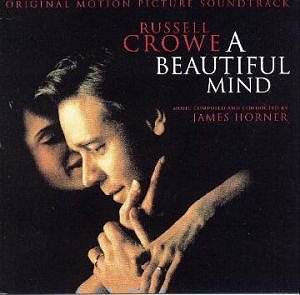James HORNER
A Beautiful Mind
OST featuring Charlotte Church (soprano)
DECCA 016 191-2 [71:07]

I can hardly believe that the Academy has chosen to nominate this disappointing effort rather than Horner’s far superior work on Iris (reviewed on this site this month).
A Beautiful Mind must be a difficult type of movie to score for much of the ‘action’ is cerebral, ‘A kaleidoscope of mathematics’ for instance is, perhaps, hardly calculated to set a musical mind aflame with inspiration. Horner’s not very imaginative response is to set Charlotte Church off in a sort of wordless whirring with strings and piano in frenetic support seeking some sort of numeric Shangri-la. Much of this score sends Church quietly musing and questing, accompanied by wandering, coy piano figures and interrogatory strings. Sometimes the music is almost static, deeply pensive; brushed cymbals gently nudging the music forward. This device also suggests success and celebration in one of the few really upbeat tracks ‘Creating "Governing Dynamics". Add tolling bells and a dash of the usual menace and intrigue figurations, and you have ‘Cracking the Russian codes". Horner in self-quotation mode is apparent, there are many of the familiar Horner fingerprints in tracks like ‘Nash descends into Parcher’s World’ and there is a more than subtle reference to that awful Titanic song in ‘Saying goodbye to those you love’. Earlier, in ‘Playing a game of "go!"’ the music is close to Danny Elfman in Edward Scissorhands mode. ‘Alicia discovers Nash’s dark world’ mixes quasi military figures with the sort of Russian music that Kubric used as source material in 2001.
The obligatory song, the rather soporific ‘All Love Can Be’, delivered by Charlotte Church, is at least an improvement over ‘My Heart Will Go On’. But it has to be said that the talents of Ms Church are rather wasted. The Closing Credits enlarge on her song with the orchestra saccharine and cloying.
On a positive note, Horner’s music suggests, very well, the isolation and loneliness and mental anguish of the master mathematician and I should think that it will work well with the film. (It has not arrived at a theatre near me yet.) But hearing this album, I find myself reporting again what I, regretfully, have had to say too often before, that at 71 minutes torpor overtakes interest.
Ian Lace

Return to Index